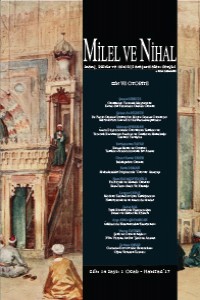Öz
The authority that has been accepted as a sacred phenomenon by many
religious traditions is related to God who is the highest authority and therefore
all powers that have the right of authority have to legitimize their
authority by God. Some religious traditions question the legitimacy of authoritarian
powers, and accept it as legitimate if it is appropriate to the
rules and orders defined by God. Some traditions, on the other hand, accept
the current authorities as legitimate and supply them a background of theological
justification. The cult of king-God supplies a perspective in this
direction. Also the doctrine of every authoritarian structure was founded
by God, and consequently has a legitimacy supplies a theological justification
to all authorities. This doctrine that is expressed particularly by Christianity
is closely connected to the development of such social structures as
secularism, liberalism and democracy.
Key Words: Authority, theological justification,
Anahtar Kelimeler
Authority theological justification cult of king-god Christianity Islam
Kaynakça
- Josephson, J.A., The Invention of Religion in Japan, University of Chicago Press 2012. Kotan, Ş., Kur’an ve Tarihselcilik, İstanbul: Beyan 2001.. Liade, M, L.E. Sullivan, “Deus Otiosus”, Encyclopedia of Religion, (second edition), ed. L. Jones, c. 4, Thomson Gale, 2005. Mortimer, E., Faith and Power: The Politics of Islam, London: Faber and Faber 1982. Paul, S.M., Studies in the Book of Covenant in the Light of Cuneiform and Biblical Law, Leiden: Brill 1970. Schoeps, H.J., Paul: The Theology of the Apostle in the Light of Jewish Religious History, tr. H. Knight, Philadelphia: The Westminster Press 1961. Tertullian, The Apology, xxxiii, http://www.newadvent.org/fathers/ 0301.htm (Copyright © 2000 by Kevin Knight). Westmoreland, C., Deism: The Knowledge of God –Based Reason and Nature, Lulu Press 2015. Weaver, J.D., “Violence in Christian Theology”, http://www.crosscurrents. org/weaver0701.htm. Seib, P., D.M. Janbek, Global Terrorism and the New Media; The Post-Al Qaeda Generation, New York: Routledge 2011. Silberman, I, E.T Higgins, C.S. Dweck, “Religion and the World Change: Violence and Terrorism versus Peace”, Journal of Social Issues, 61:4, 2005. “The Religiousness of Violence”, (the Editors), Numen, 52:1, 2005. Unqureanu, Daniel, “Sayyid Qutb’s Ideological Influence on Contemporary Muslim Communities Accross Western Europe”, International Journal of Philosophy of Culture and Axiology, 7:2, 2010.
Öz
Birçok dinsel gelenek kutsal bir fenomen olarak kabul ettiği otoriteyi, en
kutsal olan Tanrıyla ilişkilendirir. Tanrı en üst otoritedir ve otorite yetkisine
sahip olan tüm gü.ler meşruiyetini tanrıdan almak durumundadır.
Bazı dinsel gelenekler tanrıdan hareketle mevcut otoriter gü.lerin meşruiyetini
tartışır. Buna göre tanrının belirlemiş olduğu kurallara ve sınırlara
riayet ediyorsa otorite meşru olarak kabul edilir. Bazı dinsel geleneklerde
ise mevcut otoriter yapılar esas alınarak bunlara teolojik meşruiyet zemini
oluşturulur. Kral-tanrı kültü bağlamında otoriter gü.lerin değerlendirilmesi
bu bağlamdadır. Bunun dışında en dikkat çekici perspektif ise tanrının
dünyevi egemenlik alanını insana bıraktığı ve bu doğrultuda nasıl
olursa olsun her otoriter yapının teolojik bir meşruiyete sahip olduğu yaklaşımıdır.
Özellikle Hıristiyanlık tarafından dillendirilen bu yaklaşımın, bir
şekilde günümüzdeki sekülerizm, liberalizm ve demokrasi gibi yapıların
gelişimiyle yakın ilişkisi vardır.
Anahtar Kelimeler
Kaynakça
- Josephson, J.A., The Invention of Religion in Japan, University of Chicago Press 2012. Kotan, Ş., Kur’an ve Tarihselcilik, İstanbul: Beyan 2001.. Liade, M, L.E. Sullivan, “Deus Otiosus”, Encyclopedia of Religion, (second edition), ed. L. Jones, c. 4, Thomson Gale, 2005. Mortimer, E., Faith and Power: The Politics of Islam, London: Faber and Faber 1982. Paul, S.M., Studies in the Book of Covenant in the Light of Cuneiform and Biblical Law, Leiden: Brill 1970. Schoeps, H.J., Paul: The Theology of the Apostle in the Light of Jewish Religious History, tr. H. Knight, Philadelphia: The Westminster Press 1961. Tertullian, The Apology, xxxiii, http://www.newadvent.org/fathers/ 0301.htm (Copyright © 2000 by Kevin Knight). Westmoreland, C., Deism: The Knowledge of God –Based Reason and Nature, Lulu Press 2015. Weaver, J.D., “Violence in Christian Theology”, http://www.crosscurrents. org/weaver0701.htm. Seib, P., D.M. Janbek, Global Terrorism and the New Media; The Post-Al Qaeda Generation, New York: Routledge 2011. Silberman, I, E.T Higgins, C.S. Dweck, “Religion and the World Change: Violence and Terrorism versus Peace”, Journal of Social Issues, 61:4, 2005. “The Religiousness of Violence”, (the Editors), Numen, 52:1, 2005. Unqureanu, Daniel, “Sayyid Qutb’s Ideological Influence on Contemporary Muslim Communities Accross Western Europe”, International Journal of Philosophy of Culture and Axiology, 7:2, 2010.
Ayrıntılar
| Bölüm | Makaleler |
|---|---|
| Yazarlar | |
| Yayımlanma Tarihi | 29 Haziran 2017 |
| Gönderilme Tarihi | 20 Nisan 2017 |
| Yayımlandığı Sayı | Yıl 2017 Cilt: 14 Sayı: 1 |


